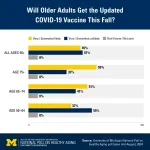(Press-News.org) The newly updated COVID-19 vaccine just arrived in pharmacies and clinics nationwide, and a new poll suggests nearly half of people age 50 and older plan to get it. But some older adults with high risk of severe illness appear unlikely to seek the vaccine, and interest varies widely by age group, education level, race and ethnicity, and other factors, the poll shows.
In all, 45% of people age 50 and older say they’re likely to get the updated vaccine, according to the new findings from the University of Michigan’s National Poll on Healthy Aging. The data come from polling done in August 2024, just before the new vaccine was released but after it was officially recommended by the federal Centers for Disease Control and Prevention.
The poll shows the highest rate of interest in the new vaccine in the age group most at risk of severe illness and hospitalization if they catch the coronavirus: those age 75 and up. In all, 59% of this age group said they were likely to get the updated COVID-19 shot, with 49% of them saying they’re very likely and 10% saying they’re somewhat likely.
The next youngest age group, age 65 to 74, also had a majority saying they’re likely to get vaccinated, at 51% total, including 40% who say they’re very likely.
But among those in the youngest group (50 to 64), more people said they’re unlikely to get the vaccine than said they were likely to get it, at 55% unlikely vs. 37% likely.
Across all age groups, 8% of older adults said they didn’t know or weren’t sure about whether they would get the updated vaccine.
“We know that this virus is most likely to cause severe illness in the oldest people, with people over age 75 accounting for nearly half of all COVID-19 hospitalizations since last fall, and at least 44,000 deaths of people over age 65 directly due to COVID-19 last year,” said Preeti Malani, M.D., M.S., a senior advisor to the poll and an infectious disease physician at Michigan Medicine, U-M’s academic medical center.
“The vaccine offers protection against illness, including severe illness, in people of all ages, especially those who have underlying health issues,” she added. “Our new poll data suggest that providers and healthcare organizations need to do more to encourage older adults to get vaccinated soon, especially given the current wave of cases and the likelihood of another wave this winter.”
The poll is based at the U-M Institute for Healthcare Policy and Innovation, and supported by AARP and Michigan Medicine, U-M’s academic medical center.
Who should get the updated vaccine and why
The CDC officially recommends the updated COVID-19 vaccines for everyone over the age of 6 months. Because of this, the vaccines are available without cost to nearly everyone at pharmacies and clinics nationwide, though private insurance plans can set the approved locations for their plan members. Vaccines for uninsured adults may be available through local health departments and safety-net clinics.
Malani notes that vaccine manufacturers Pfizer, Moderna and Novavax have tailored the vaccines to help the body’s immune system fight off currently circulating strains of the virus that causes COVID-19.
The annual updates aim to accomplish the same goal as the tailoring of the annual flu shot to reflect mutations in the influenza virus. Both viruses mutate regularly as they travel from person to person around the world each year.
The newly updated COVID-19 vaccine replaces the one that became available last fall, which was also recommended for everyone over the age of 6 months. Malani notes that even people who received one or more doses of last year’s vaccine should receive the new one to fine-tune their immunity.
People who had a confirmed case of COVID-19 during this summer’s wave are encouraged to wait until three months have passed before getting vaccinated with the updated vaccine.
Differences by demographic groups
Older adults with a bachelor’s degree or higher were more likely to say they’re likely to get vaccinated, at 54% compared with 41% of those with lower levels of education.
Older adults who identify as Black or Asian were more likely than those of other backgrounds to say they were likely to get vaccinated, at 52% and 49%, respectively, compared with the 44% for both Hispanic and white non-Hispanic older adults. But Black older adults were also more likely than other groups to say they didn’t know or weren’t sure if they would get vaccinated, at 16%.
Meanwhile, 49% of white non-Hispanic older adults said they were somewhat or very unlikely to get the vaccine -- the highest of all groups by as much as 17 percentage points.
The poll team also examined vaccination intentions among those people over 50 who live with children under the age of 18, whether their own children, or grandchildren or other minors. Past research has shown in as many as 70% of situations where people catch the coronavirus from someone they live with, children are the source.
The new poll finds that people over 50 who live with at least one child or teen were less likely to say they’re likely to get the updated vaccine against COVID-19 than those without children in their homes (36% vs. 46%).
In all, women were slightly more likely than men to say they’re somewhat or very likely to get the updated vaccine, and slightly more likely to say they didn’t know yet or weren’t sure.
Michigan-specific findings
In addition to the national poll data, the team also gauged vaccine interest among older adults living in Michigan, with support from the Michigan Health Endowment Fund.
Compared with older adults living in other states, Michiganders over the age of 50 were more likely to say they’re somewhat or very likely to get the updated vaccine, with 50% saying so compared with 45%.
There was also a significant difference between Michiganders based on income, with 54% in higher income households (incomes of $60,000 and above) saying they were likely to get the vaccine compared with 46% of those in households with lower incomes. There was no significant difference by income in the national sample.
Protection for the most vulnerable
The new poll does not include people who live in institutional settings such as nursing homes and long-term care.
But Malani says it’s especially important to ensure that older adults living in these and other settings, such as assisted living facilities, get the new COVID-19 vaccine. Around 19% of all COVID-related hospitalizations among people over age 65 last year were among residents of nursing homes.
“As the pandemic continues, we need to ensure that our most vulnerable have the best and most up-to-date protection they can get, which means getting all the doses recommended for them,” she said. “In fact, people who have a health condition or take a medication that compromises their immune system can get an additional dose or doses of the new updated vaccine two months after they get their first dose.”
A full list of such conditions is available from the CDC but includes:
people currently in treatment for cancer,
those with a history of a blood cancer,
those who have gotten an organ or bone marrow transplant,
those taking high-dose steroids for any condition, and
those taking other medicines that can affect the immune system, such as injected drugs for autoimmune conditions including rheumatoid arthritis, ulcerative colitis and Crohn’s disease.
Visit vaccines.gov (www.vaccines.gov/es in Spanish) to find a location for vaccination near you.
The poll findings come from a nationally representative survey conducted by NORC at the University of Chicago for IHPI and administered online and via phone in August 2024 among 3,482 adults ages 50 and older. The sample was subsequently weighted to reflect the U.S. and Michigan populations.
Read past National Poll on Healthy Aging reports and about the poll methodology.
END
COVID-19 hits older adults hardest; which ones want the updated vaccine?
Poll shows those in their 50s and early 60s, those over 50 who live with children, and other groups may need more encouragement from clinicians and other sources to get vaccinated
2024-09-23
ELSE PRESS RELEASES FROM THIS DATE:
Mental health issues are a common phenomenon in elite sport
2024-09-23
Nearly three-quarters of Dutch elite athletes and forty percent of their coaches report sport-related distress. This is one of the findings from a study conducted by Amsterdam UMC together with NOC*NSF, the organisation which represents the Dutch Olympic Committee and the Dutch Sport Federation, published today in BMJ Open Sport & Exercise Medicine.
The most common mental health problem among athletes and coaches is report sport-related distress (73% and 41%, respectively). Unfavorable alcohol consumption that can negatively affect sports performance is also common (52% and 53%). In athletes, ...
New insights into intellectual disability genetics emerge at Mount Sinai
2024-09-23
New York City (Sep 24, 2024) – Researchers at the Icahn School of Medicine at Mount Sinai have published a pivotal study in Nature Genetics (DOI: 10.1038/s41588-024-01917-1) that sheds light on a novel genetic variant associated with intellectual capacities and educational outcomes. This discovery offers new insights into intellectual disability diagnostics and potential therapeutic avenues.
The study reveals the significant impact of tandem repeats—sequences of DNA where a pattern of nucleotides is repeated multiple times in a head-to-tail manner on a chromosome—on intellectual functioning.
"The ...
Older people are more swayed by the impulsive actions of others when making financial decisions – new study reveals
2024-09-23
Older people are more likely to be influenced by the impulsive financial preferences of others than their younger counterparts, according to a new study.
Research lead by psychologists at the University of Birmingham and the University of Oxford published today in Communications Psychology, reveals that people aged 60 and over are more prone to being influenced by other people when it comes to making impulsive financial decisions compared to young adults aged between 18 -36.
The study set out to explore delayed gratification and how our willingness to wait and social influence develop and differ across our lifespan. To test how age ...
Leading scientists redefine ‘sustainability’ to save the ocean and feed a hungry and warming planet
2024-09-23
Top ocean experts have published a report that redefines the concept of “sustainable fishing” and proposes 11 “golden rules” that radically challenge the flawed approach that currently prevails in fisheries management.
Published a week before Brussels’ Ocean Week, and a few months before the UN Ocean Conference in Nice, the rules have been devised to put an end to the ongoing destruction of the oceans caused by fishing, and ensure the renewal of abundant fish populations to feed future generations.
They come at a time when scientists have drastically downgraded their assessment of the ocean’s health status.
The rules ...
Experts discover the deadly genetics of cholera, which could be key to its prevention
2024-09-23
Experts have used a cutting-edge computational approach to discover the genetic factors that make the bacteria behind cholera so dangerous - which could be key to preventing this deadly disease.
The breakthrough study, published in Nature Communications, is led by Professor Tania Dottorini from the University of Nottingham, in collaboration with Bangladesh’s Institute of Epidemiology, Disease Control and Research (IEDCR), International Centre for Diarrhoeal Disease Research, Bangladesh, and North South University.
The innovative research combines machine learning, genomics, genome-scale metabolic modelling (GSMM), and 3D ...
How remarkable diversity in heat tolerance can help protect coral reefs
2024-09-23
New research out of Southern Cross University has found previously undocumented variation in coral heat tolerance on Australia's Great Barrier Reef, giving hope that corals’ own genetic resources may hold the key for us to help in its recovery and adaptation.
In a study to be published (at 10am BST, Mon Sept 23, 2024) in Communications Earth and Environment, researchers measured the bleaching thresholds of more than 500 colonies of the table coral, Acropora hyacinthus, using a portable experimental system that was used at sea at 17 reefs spanning the Great Barrier Reef.
The study was led by Southern Cross University PhD candidate Melissa ...
Most new recessive developmental disorder diagnoses lie within known genes
2024-09-23
Scientists have conducted the largest and most diverse study to date on how recessive genetic changes contribute to developmental disorders1. They found that most undiagnosed cases that are due to recessive causes are linked to genes we already know about, and suggest a shift in research focus could improve diagnosis rates.
Researchers from the Wellcome Sanger Institute and their collaborators at GeneDx analysed genetic data from nearly 30,000 families affected by developmental disorders – six times more families with greater diversity in ancestral ...
Compact “gene scissor” enables effective genome editing
2024-09-23
CRISPR-Cas systems, which consist of protein and RNA components, originally developed as a natural defense mechanism of bacteria to fend off intruding viruses. Over the last decade, re-engineering these so-called “gene scissors” has revolutionized genetic engineering in science and medicine. The tools can be programmed to find a specific location in our DNA and edit the genetic information in a precise manner. For example, a disease-causing mutation in the DNA can be reverted to its ...
New report: Nvidia is going for quality not quantity with AI chip patents
2024-09-23
A new analysis of semiconductor patents released today by IFI CLAIMS Patent Services helps to explain why the recently embattled Nvidia is a world leader in AI microchips, despite only appearing 9th on the list of top companies for the number of AI chip patents.
Key points:
The analysis by IFI CLAIMS Patent Services – a Digital Science company and the patent industry’s most trusted data provider – shows that the Top 5 companies in the US for the number of AI chip patents are: IBM, Samsung, Intel, Google and Microsoft, with IBM way out in front.
However, while Nvidia is currently 9th among the Top 10 in the US for the number of AI chip patents, Nvidia ...
Do cancer and cancer-related treatments increase cardiovascular disease risk in older cancer survivors?
2024-09-23
A study based on clinical trial data found higher risks of stroke, heart attack, and hospital admission for heart failure in older cancer survivors. In the analysis published by Wiley online in CANCER, a peer-reviewed journal of the American Cancer Society, chemotherapy was also linked to elevated rates of these conditions.
Although advances in treatment have led to decreased cancer mortality over the past decade, the growing numbers of cancer survivors may experience long-term effects of cancer and anticancer therapies. For example, the heart may be especially vulnerable to inflammation triggered by cancer and toxic effects from chemotherapy and radiation.
To investigate cardiovascular ...
LAST 30 PRESS RELEASES:
ASU researchers to lead AAAS panel on water insecurity in the United States
ASU professor Anne Stone to present at AAAS Conference in Phoenix on ancient origins of modern disease
Proposals for exploring viruses and skin as the next experimental quantum frontiers share US$30,000 science award
ASU researchers showcase scalable tech solutions for older adults living alone with cognitive decline at AAAS 2026
Scientists identify smooth regional trends in fruit fly survival strategies
Antipathy toward snakes? Your parents likely talked you into that at an early age
Sylvester Cancer Tip Sheet for Feb. 2026
Online exposure to medical misinformation concentrated among older adults
Telehealth improves access to genetic services for adult survivors of childhood cancers
Outdated mortality benchmarks risk missing early signs of famine and delay recognizing mass starvation
Newly discovered bacterium converts carbon dioxide into chemicals using electricity
Flipping and reversing mini-proteins could improve disease treatment
Scientists reveal major hidden source of atmospheric nitrogen pollution in fragile lake basin
Biochar emerges as a powerful tool for soil carbon neutrality and climate mitigation
Tiny cell messengers show big promise for safer protein and gene delivery
AMS releases statement regarding the decision to rescind EPA’s 2009 Endangerment Finding
Parents’ alcohol and drug use influences their children’s consumption, research shows
Modular assembly of chiral nitrogen-bridged rings achieved by palladium-catalyzed diastereoselective and enantioselective cascade cyclization reactions
Promoting civic engagement
AMS Science Preview: Hurricane slowdown, school snow days
Deforestation in the Amazon raises the surface temperature by 3 °C during the dry season
Model more accurately maps the impact of frost on corn crops
How did humans develop sharp vision? Lab-grown retinas show likely answer
Sour grapes? Taste, experience of sour foods depends on individual consumer
At AAAS, professor Krystal Tsosie argues the future of science must be Indigenous-led
From the lab to the living room: Decoding Parkinson’s patients movements in the real world
Research advances in porous materials, as highlighted in the 2025 Nobel Prize in Chemistry
Sally C. Morton, executive vice president of ASU Knowledge Enterprise, presents a bold and practical framework for moving research from discovery to real-world impact
Biochemical parameters in patients with diabetic nephropathy versus individuals with diabetes alone, non-diabetic nephropathy, and healthy controls
Muscular strength and mortality in women ages 63 to 99
[Press-News.org] COVID-19 hits older adults hardest; which ones want the updated vaccine?Poll shows those in their 50s and early 60s, those over 50 who live with children, and other groups may need more encouragement from clinicians and other sources to get vaccinated



